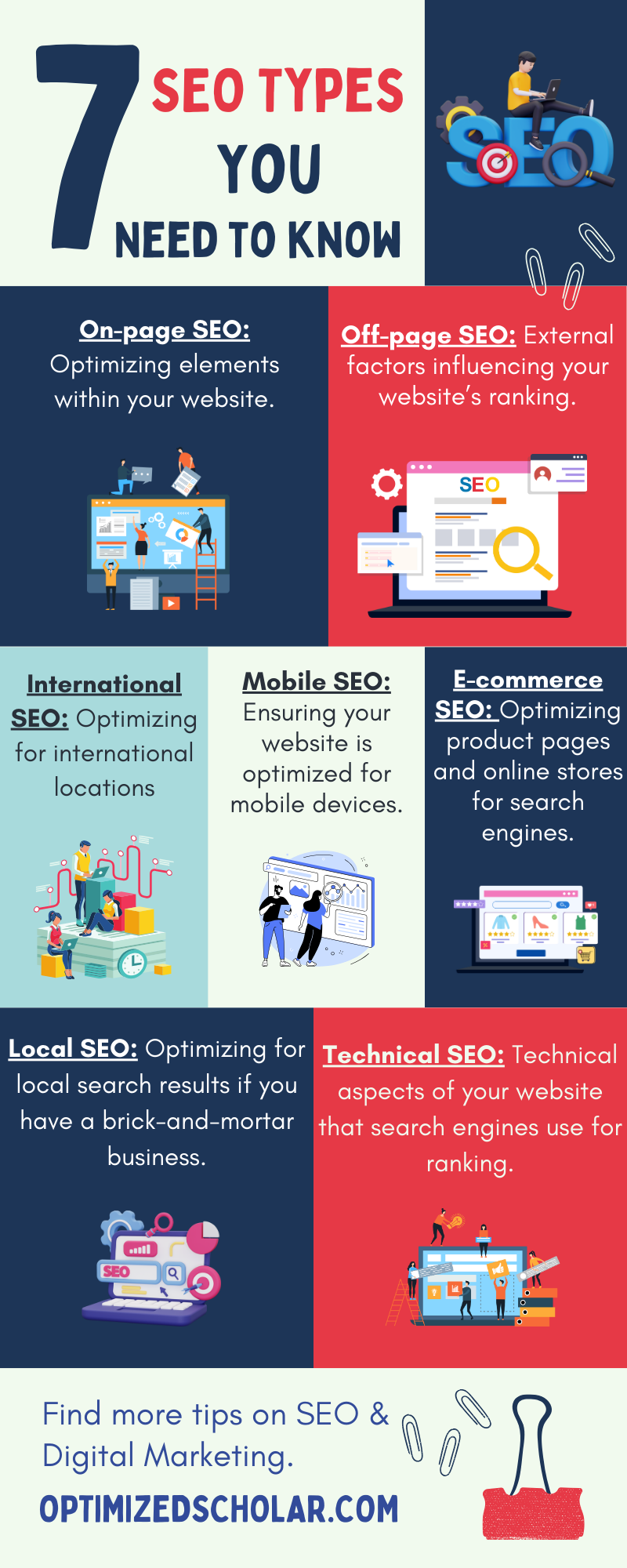7 SEO Types You Need to Know: From On-Page to Global Reach
February 13, 2024 2024-04-17 10:547 SEO Types You Need to Know: From On-Page to Global Reach

7 SEO Types You Need to Know: From On-Page to Global Reach
SEO, or Search Engine Optimization, is the process of improving your website’s visibility and ranking in search engine results pages (SERPs) for relevant keywords. The higher your website ranks for relevant searches, the more likely people are to find it organically, leading to increased website traffic and potential business opportunities.
Here’s a breakdown of how SEO works:
What it involves:
- On-page optimization: Creating high-quality and informative content that targets relevant keywords, optimizing website structure and code, and ensuring good user experience.
- Off-page optimization: Building backlinks from other websites, engaging in social media marketing, and leveraging local SEO strategies if applicable.
- Technical SEO: Ensuring your website is mobile-friendly, fast-loading, and crawlable by search engines.
Benefits of Good SEO:
- Increased organic traffic: Attract potential customers directly from search engines without relying solely on paid advertising.
- Improved brand awareness: Increased visibility builds brand recognition and trust.
- Targeted audience reach: Reach users actively searching for products or services you offer.
- Cost-effective: Compared to paid advertising, SEO can be a more cost-effective way to generate leads and sales in the long run.
Different types of SEO:

#1. On-Page SEO: Laying the Content Foundation
Think of on-page SEO as crafting a compelling story within your website. It involves optimizing the elements users and search engines interact with directly.
- Content is King: Create high-quality content that targets relevant keywords, resonates with your audience, and offers value. Regularly update and refresh your content for continued relevance.
- Keyword Magic: Research and strategically incorporate relevant keywords throughout your content, including titles, meta descriptions, headlines, and body text.
- Structure Matters: Implement a clear and user-friendly website structure with logical navigation, internal linking, and proper heading hierarchies.
- Technical Excellence: Ensure optimal website speed, mobile-friendliness, and image optimization for a seamless user experience.
- Schema Markup: Add structured data markup to provide search engines with richer information about your content, potentially enhancing search results.
#2. Off-Page SEO: Building Buzz Beyond Your Site
While on-page SEO focuses on your internal world, off-page SEO ventures out to establish your website’s authority and credibility in the wider online landscape.
- Backlink Bonanza: Earn high-quality backlinks from relevant and authoritative websites. Focus on quality over quantity and avoid spammy link-building tactics.
- Social Butterfly: Build your brand presence and social media following. Share valuable content, engage with your audience, and leverage social media platforms for promotion.
- Local Focus: If you have a brick-and-mortar business, claim and manage your Google My Business listing, utilize local directories and citations, and optimize for local search terms.
#3. Technical SEO: The Website's Underpinnings
Technical SEO ensures your website’s technical aspects are in top shape, allowing search engines to crawl and index your content effectively.
- Mobile-First Approach: Prioritize mobile optimization, as most users now search on smartphones. Ensure your website is responsive, loads quickly, and offers a seamless experience across all devices.
- Crawlability & Indexability: Ensure your website structure and robots.txt file are configured correctly to allow search engines to crawl and index your content efficiently.
- Structured Data: Implement schema markup to provide search engines with richer information, potentially enhancing search results visibility.
- Site Speed: Address factors like image optimization, code minification, and caching to ensure your website loads quickly and provides a positive user experience.
#4. Local SEO: Catering to Your Neighborhood
For brick-and-mortar businesses, local SEO helps you attract customers searching for nearby services or products.
- Claim & Manage Listings: Claim and manage your Google My Business listing, ensuring accurate information and positive reviews.
- Local Directories & Citations: Get your business listed in relevant local directories and online citations, building local presence and online trust.
- Local Keywords: Target relevant local keywords in your content, meta descriptions, and website structure.
- Optimize for Local Search: Utilize local search features like Google Maps integration and optimize for local search results based on your geographic location.
#5. E-commerce SEO: Optimizing Your Online Store
In the competitive world of e-commerce, SEO helps your products stand out and attract potential buyers.
- Product Page Optimization: Optimize product pages with relevant keywords, high-quality product images and descriptions, and clear product categories.
- Internal Linking: Structure your website for intuitive product discovery with relevant internal linking between categories and product pages.
- Technical SEO Optimization: Ensure your online store is fast-loading, mobile-friendly, and has a user-friendly checkout process.
- Reviews & User-Generated Content: Encourage customer reviews and leverage user-generated content to build trust and improve search ranking potential.
#6. International SEO: Expanding Your Global Reach
If you target international audiences, SEO strategies need to adapt to different languages and regions.
- Hreflang Tags: Use hreflang tags to indicate language variations and target specific regions effectively.
- Localized Content: Create and adapt content for different languages and regions, considering cultural nuances and local search trends.
- International Backlinks: Build backlinks from relevant websites in your target countries and languages.
- Regional Search Engine Optimization: Adapt your SEO strategies to the specific search algorithms and preferences of the target region.
#7. Mobile SEO: Catering to the On-the-Go User
With mobile dominating search, optimizing your website for smartphones and tablets is crucial.
- Responsive Design: Implement a responsive design that adapts seamlessly to different screen sizes
Final thought:
SEO, when mastered, becomes a harmonious symphony where each type plays its part in attracting traffic and amplifying your online presence. Remember, though these types differ, they work best in conjunction. By understanding and implementing on-page, off-page, technical, local, e-commerce, international, and mobile SEO strategies, you’ll create a website that not only ranks high in search results but also resonates with your audience and achieves your business goals.
However, SEO is a constant learning curve. Stay updated with the latest algorithms, embrace experimentation, and track your progress through data analysis. Don’t be afraid to seek help from professionals and remember, the journey to SEO mastery is ongoing. So, keep optimizing, keep learning, and watch your website climb the search engine ladder, attracting the organic traffic you deserve.
Bonus Tip: Share your SEO knowledge and experiences in the comments below! Let’s build a community of SEO enthusiasts and support each other’s online success.
FAQs:
1. I'm overwhelmed by all these SEO types! Where should I start?
2. Does local SEO even matter if I only sell online?
3. I'm on a tight budget. Are there any affordable SEO tactics I can try?
Optimized Scholar
Search
Popular posts
- Power of Generative AI: Revolutionizing Digital Marketing with Emotional Impact and Cutting-Edge Innovation
- Harness the Potential of Generative AI: Cutting-Edge Technologies and Industry Applications
- Conquer the E-commerce Everest: India’s Omnichannel Mastery Guide
- Craft Your India Marketing Magic: Hyper-Personalization with AI (Future-Proof Your Brand)
- Speak Their Language, Win Their Hearts: The Emotional Power of Vernacular Marketing
Popular tags

